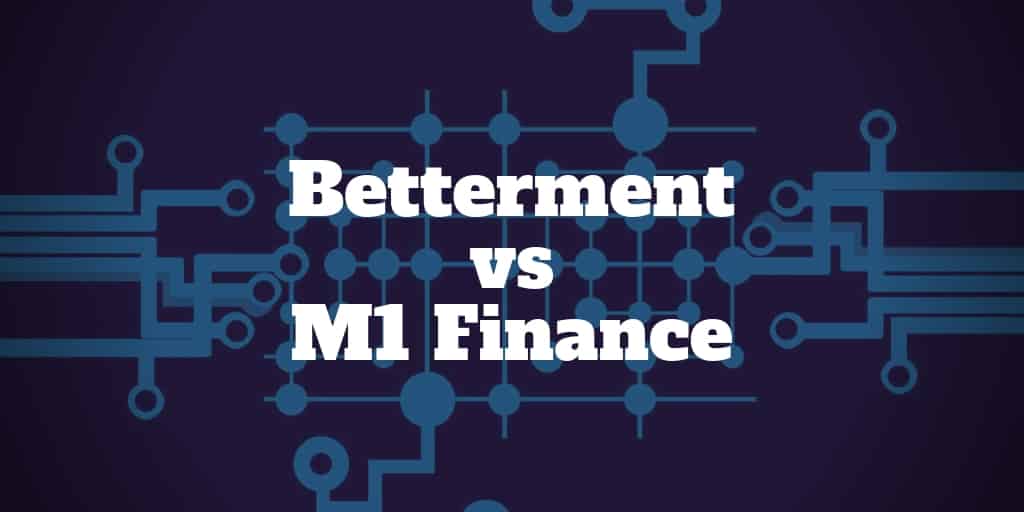
In this review, we compare Betterment vs M1 Finance to find out which robo-advisor is best when it comes to fees, investment minimums, tax strategy, and account types.
Betterment is a clear leader in the robo-advisor industry. With billions of dollars of assets under management, a focus on after-tax returns, socially responsible portfolios, and a charitable giving platform to name but a few of its services, Betterment is strides ahead of most other robo-advisors.
So, you might think the slam dunk choice between Betterment or M1 Finance is the former. But M1 Finance should not be ignored by any means. It is less a pure robo-advisor than it is a hybrid of a classic brokerage firm and an automated investment management service. For investors who want more control, M1 Finance has much to offer.
M1 Finance vs Betterment Features


What Is Betterment?
Betterment is a robo-advisor firm that flips the old school financial advisor model on its head.
By using computer algorithms to manage assets, Betterment can serve many more clients than a traditional advisor, who would typically manage each portfolio manually.
For clients who are satisfied with digital advice and portfolio management only, Betterment Digital, the basic service level, is more than sufficient.
Betterment Digital comes with a lot of bells and whistles beyond automated investment management. Clients enjoy free portfolio balancing and tax-loss harvesting services, as well as access to retirement tools and socially responsible portfolios.
Investors who want access to human advice can sign up to Betterment Premium, the higher tier service that provides in-app access to financial consultants and unlimited phone calls with them too.
The next 10 minutes could change your life. We've recorded a special sit-down interview with a reclusive millionaire who details how he's closed out winning trade after winning trade throughout the volatility of 2022. In fact, he hasn't closed a single losing trade since 2016. Sounds impossible? It's not - and he'll prove it to you.
Click to see this exclusive sit-down interview
What Is M1 Finance?
M1 Finance is a mix between a robo-advisor and a brokerage firm.
The problem with a classic brokerage firm is active traders often create portfolios that drift out of balance over time. So, M1 Finance will keep portfolios balanced automatically after you first create them.
Portfolios generally fall into two categories: “My Pies” and “Expert Pies”
My Pies are custom-built portfolios that clients build using stocks, ETFs, and even Expert Pies.
Expert Pies are ready-made portfolios created by team experts and partners.
You’ll also see visualizations of portfolios on the platform, which are simply called Pies.
For hands-off investors who want the best of both worlds, automated investment management plus control over their portfolios, M1 Finance is the ideal solution.
➤ Free Guide: 5 Ways To Automate Your Retirement
Betterment Fees vs M1 Finance Fees
Betterment Fees
Management fees start at 0.25% of managed assets for its Digital service and are capped at 0.40% annually for Betterment Premium.
No annual, transfer, or closing fees are charged by Betterment. However, you will pay an expense ratio, which is the charge applied by funds in which your money is invested.
Expense ratios pay the operating costs of exchange-traded funds and are generally passed on to investors by robo-advisors and traditional financial advisors.
M1 Finance Fees
M1 Finance is a lot less expensive than other brokerages. In fact, it’s impossible to beat it on cost thanks to its no-commissions and no management fees policy.
So, how does M1 Finance make money? Like Robinhood, M1 Finance makes money from its order flow as well as lending securities to short sellers.
Fees Comparison: M1 Finance & Betterment
| Robo-advisor | $10,000 | $100,000 | $1,000,000 | $3,000,000 | Open an Account |
| Betterment Management Fees | $25 | $250 | $2,500 | $5,000 | |
| M1 Finance Management Fees | $0 | $0 | $0 | $0 |
| Investormint Verdict: Clearly, M1 Finance wins the fees battle thanks to its zero cost policy but if you are currently with a traditional financial advisor, Betterment is cheaper. |
M1 Finance Vs Betterment
Investment Minimums
Betterment Account Minimum
Betterment Digital: No account minimum is required to open a Betterment Digital account.
Betterment Premium: For clients who want access to human advisors as part of the higher tier service, a $100,000 investment minimum is in place.
M1 Finance Account Minimum
Technically, there are no account minimums but investment minimums are imposed when making first deposits to open accounts.
Minimum first deposit for taxable brokerage account: $100
Minimum first deposit for IRA account: $500
If a user deposits $100 in a brokerage account, buys stock, and subsequently the account value drops below $100, no fees or penalties apply – even though the account balance dropped below the minimum first deposit threshold.
Users are required to meet the minimum first deposit levels to begin investing in any M1 portfolio, whether it’s made up of custom My Pies, stocks, funds, Expert Pies, or any combination.
Investors who want access to margin trading must meet minimum account balance requirements of $10,000. The portfolio line of credit, called M1 Borrow, is immediately available to users who have account balances above that threshold level. The M1 Borrow rate is currently 4%.
They can borrow as much as 35% of their portfolio balances. Once an account balance falls below $10,000, margin privileges are removed.
| Investormint Verdict: M1 Finance wins when it comes to investment minimums. Even though Betterment has no minimum for its entry-level service, the $100,000 minimum for Premium is high and docks it a few points in our view. |
Do you know how to read the candlesticks on your chart? If not don't worry. Chris Pulver created an ebook, Candlestick Cheat Sheet, that can teach you, in layman terms, the 10 most powerful candlestick patterns. It's a great start for those that are new to Forex and may want to trade on the conservative side when starting out.
Click here to download your copy now
M1 Finance Vs Betterment
Tax Strategy
Betterment Tax Strategy
Experienced investors know that Uncle Sam likes to take his share of investment gains. Minimizing tax implications can lead to a significant improvement in performance returns over time.
Betterment is savvy to the impact of taxes on portfolios and has clear strategies to help clients keep more of their gains.
Tax-loss harvesting is applied to all accounts free of charge. This strategy is designed to minimize taxable gains by selling losing positions and replacing them with similar positions in order to maintain diversified portfolios.
Tax coordinated portfolios are another feature offered by Betterment to limit tax implications. While tax-loss harvesting applies only to taxable accounts, tax-coordinated portfolios places highly taxed funds in tax-advantaged accounts and lower taxed funds in standard accounts.
M1 Finance Tax Strategy
M1 Finance offers a tax minimization strategy but it falls short of tax-loss harvesting or indeed tax-coordinated services.
| Investormint Verdict: As a more traditional brokerage with a robo-advisor overlay, it’s not surprising that M1 Finance fails to stand toe-to-toe with Betterment when it comes to automating tax strategies. The bottom line is Betterment enjoys a clear victory. |
Betterment Vs M1 Finance
Account Types
Betterment Account Types
Betterment was founded in 2008 and it’s no surprise given its longevity that it’s built up a broad service that caters to numerous account types, including:
- Individual accounts
- Joint non-retirement accounts
- Roth IRA accounts
- SEP IRA accounts
- Traditional IRA accounts
- Rollover IRA accounts
- Trusts
One notable exception on the list is 401(k) accounts, which Betterment does not support. However, Betterment will advise on employer-sponsored plans.
Nevertheless, if you want your 401(k) managed digitally, the best service is blooom.
M1 Finance Account Types
Like Betterment, M1 Finance supports standard, taxable accounts as well as a host of retirement accounts, including:
- Traditional IRA
- SEP IRA
- Rollover IRA
- Roth IRA
And it caters to Trusts as well. But unlike Betterment, M1 Finance will not advise on 401(k) accounts.
| Investormint Verdict: While both robo-advisors support the same individual and retirement accounts as well as trust accounts, Betterment wins by advising on 401(k) accounts too. |
Betterment vs M1 Finance
Investment Strategy
Clients at M1 Finance have a lot more discretion and control over how they invest compared to those at Betterment.
While Betterment Premium customers can modify percentage allocations, M1 Finance customers can pick stocks and allocate them as they wish.
| Asset Class Type | Betterment | M1 Finance |
| US stocks | YES | YES |
| Foreign stocks | YES | YES |
| Dividend stocks | NO | YES |
| US bonds | YES | YES |
| Corporate bonds | YES | YES |
| Municipal bonds | YES | YES |
| Emerging market bonds | YES | YES |
| Real estate | NO | YES |
| Natural resources | NO | YES |
| Emerging markets | YES | YES |
| TIPS | YES | NO |
| Investormint Verdict: It’s a virtual dead heat when it comes to asset class types |
Betterment vs M1 Finance
Overall Winner
| M1 Finance Wins | Betterment Wins |
| ✅ Management Fees: No commissions and no management fees are impossible to beat! As low as Betterment fees are they don’t match M1 Finance. | ✅ Tax Implications: Tax-loss harvesting and tax-coordinated strategies are two of the tax strategies Betterment uses which give it the edge over M1 Finance’s tax minimization method. |
| ✅ Investment Minimum: Neither robo-advisor imposes an investment minimum for basic service but Betterment applies a $100,000 account minimum for its higher tier service. | ✅ Asset Classes: Investors who care about diversification will be spoiled for choice at both companies. |
| ✅ Active Investors: If control over your portfolio selections and allocations are important to you then M1 Finance offers much more flexibility. | ✅ Hands-Off Investing: Clients who wish to place their investing on auto-pilot will find Betterment an ideal fit. |
| ✅ Fractional Shares: M1 Finance features fractional shares so your cash is fully invested. It must be noted that Betterment also supports fractional shares so this is more of a tie than a win. | ✅ Account Types: Both robo-advisors cater to standard and retirement accounts but Betterment goes a step further and advises on 401(k) accounts too. |
Which Robo-Advisor Is Best For You: M1 Finance or Betterment?
The choice between M1 Finance or Betterment largely boils down to how much control you want over your investment choices.
M1 Finance is aimed at both active investors who want full control and completely hands-off investors who want a computer algorithm to manage their money.
Betterment is a pure robo-advisor aimed at hands-off investors with its automated management services, though it will connect clients to human advisors as part of its Premium service.
When it comes to fees and minimums, M1 Finance can’t be beaten – both are zero. Betterment charges low management fees for its services but it can’t beat M1 Finance on cost.
However, investors who care about after-tax returns and paying Uncle Sam as little as possible over the long-term will fare best at Betterment.
The bottom line is Betterment is ideal for hands-off investors because it has many more bells and whistles while M1 Finance is a match for active and price-sensitive investors.
The Federal Reserve has a disturbing plan that is getting ready to roll out as soon as May. This is a lot more than printing trillions of dollars or manipulating interest rates. It's about every checking account, every purchase and every money transfer in America — including yours and mine. 
Click here to discover how to protect your money








